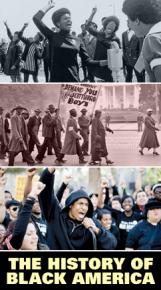The rise of the Black Muslims
looks at the roots of the organization that produced Malcolm X.
WHENEVER THE Nation of Islam or its leader Louis Farrakhan is covered in the mainstream media, they are dismissed as "reverse racists." By sensationalizing the Nation's anti-white stance and highlighting examples of Farrakhan's anti-Semitic statements, the media has tried to discredit the Nation's overall argument that the U.S. is racist to the core.
Socialists have criticisms of Farrakhan and the Nation, not only against anti-Semitism, but the organization's program of Black economic self-sufficiency, which would only benefit a minority of African Americans. But we understand that the appeal of the Muslims' ideas of Black superiority has nothing in common with white racism. Nationalism is a defensive reaction to the blatant segregation forced upon Blacks.
The left failed to grasp this when the Black Muslims, as the Nation is commonly called, first gained national attention in the late 1950s. The Nation's theory of Black superiority and its hostility towards "white devils" led many socialists to accept the media's argument that Nation members were reverse racist. Thus, the left, still reeling from the anti-Communist McCarthy witch-hunts, isolated itself from Blacks influenced by the Nation.
In fact, the Black Muslims represented one of the few political alternatives to Northern Blacks, at a time when most Black political organizations concentrated on legal assaults against Jim Crow in the South. At the same time, trade union leaders effectively sided with employers in keeping Blacks in the lowest-paid and least-skilled jobs.
So while the civil rights struggle against Southern segregation laws captured media attention, the Black majority in the North encountered conditions almost as brutal. By 1960, the differential between Black and white unemployment had reached two to one, where it remains to this day. Throughout the 1950s--a time of general economic expansion--less than half the Black working class held full-time jobs year round. Although formal segregation laws did not exist in the North, Black workers nevertheless lived in segregated neighborhoods in declining central cities.
In such conditions, the Black Muslims flourished. What had begun in Detroit as a religious sect in the early 1930s grew, under the leadership of Elijah Muhammad and organizer Malcolm X, into a movement of an estimated 100,000 members by 1961. Muhammad 's apocalyptic vision of a Black-white confrontation, articulated by Malcolm, influenced hundreds of thousands more who were not necessarily prepared to join the organization. As one youth told Black sociologist C. Eric Lincoln in 1962:
One of Socialist Worker's earliest features was a monthly series on the history of the African American struggle in the U.S., from slavery to the present day.The History of Black America
Man, I don't care what those [Nation] cats say out loud--that's just a hype they're putting down for the man (i.e. whites). Let me tell you--they've got some stuff for the man even the Mau Mau [the anti-colonial Kenyan rebels] didn't have! If he tries to crowd them like he's been used to doing to the rest of us all the time, they're going to lay it on him from here to Little Rock [Arkansas, the scene of racist violence against school desegregation].
UNABLE TO refute Malcolm X's searing criticism of racism in America, politicians and the media tried to dismiss the Black Muslims as cranks, focusing on Elijah Muhammad's claim to be the messenger of Allah, and the strict, almost militaristic discipline that came with membership in the organization.
But as the Nation grew, the government's attitude hardened, and the media's charges of "Black racism" grew more shrill. Even though the organization abstained from most civil rights struggles and did not confront the authorities, it was seen as a serious threat.
The authorities' fears were justified. Even though the Nation declined after Malcolm X was forced from the organization and assassinated in the mid-1960s, its ideas of Black self-defense and separatism were adopted by millions in what became the Black Power movement. In fact, Farrakhan's program in later years was mild compared to the demands of the radical Black nationalists in the late 1960s.
Unfortunately, many on the left of the 1960s repeated the mistake they had made earlier. Rather than starting from the position that Black and white unity must be built on Black workers' terms, some radical organizations blamed Black nationalists for splitting the movement--a charge no different than the complaint of liberals about the "racism" of Black nationalism.
Radical nationalists like the Black Panthers and other radical nationalists were more isolated when they were hit by government repression.
Whatever criticisms socialists have of Black nationalists, the first priority is to defend them from racist attack, even in the case of aggressively anti-white organizations such as the Black Muslims. Accepting the idea of "Black racism" plays into the hands of the real racists--a ruling class that benefits from the exploitation of workers and the oppression of Blacks.
A version of this article first appeared in the March 1987 issue of Socialist Worker.



